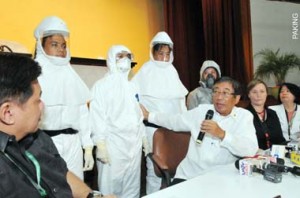
MANILA, Philippines (Eagle News Service) — The Department of Health (DOH) has declared that the Research Institute for Tropical Medicine (RITM), the country’s National Reference Center for Emerging and Re-emerging Infectious Diseases, is now more prepared to respond to the threat of Ebola Virus Disease (EVD) but still needed upgrading to better handle a possible Ebola entry in the country.
Health Secretary Enrique Ona said that the existing facilities of RITM still need to be upgraded to be able to handle diseases like Ebola, although it is now “better equipped.”
“Having managed previous global public health emergencies, the RITM has become better-equipped with rapid detection technology, laboratory, hospital facilities, and trained personnel in responding to the threat of new infectious disease agents,” Ona said.
Ona also announced that the DOH will conduct a three-day comprehensive training course for various healthcare professionals in the country. The first batch of this training will start next week, particularly on Oct. 28.
As part of the DOH’s preparation for the possible entry of the dreaded Ebola virus in the country, RITM has developed a triage system for suspected cases of EVD. Patient screening and evaluation as well as infection control practices are in place. First-line health workers in the management of cases are being trained in the donning and removing of personal protective equipment (PPE). Adequate supply of PPE is available.
RITM is upgrading DOH’s major laboratory hospitals from Biosafety Level (BSL) 2 to BSL 3 or 4 for the detection, treatment, and containment of potentially high-risk infectious agents. The National Reference Center primarily uses molecular detection methods that ensure sensitive and rapid diagnosis. In addition, its Special Pathogens Laboratory is capable of performing the currently recommended diagnostic tests for Ebola. Its hospital facility has eight negative-pressure isolation rooms, which prevent the spread of infectious agents from cases, a DOH statement said.
DOH to conduct training course for healthcare professionals in preparation for possible Ebola entry
Ona said the RITM, in coordination with the World Health Organization, will conduct a “comprehensive three-day training course” for healthcare professionals in the country to bolster preparations for the entry of an Ebola case in the country, which is always a possibility.
DOH said the that the training course will include guidelines on infection prevention and control, clinical management and isolation, laboratory diagnosis, with demonstration and hands-on sessions.
The training for the medical community was prioritized after the National Summit on Ebola Virus Disease was held on Oct. 10 this year. The training will done to ensure the readiness of health care workers in government and private hospitals for the potential entry of the Ebola virus.
“The training builds on the strong platform of experience already here in the Philippines in the prevention and treatment of diseases such as MERSCoV and H1N1. All health workers must adhere to the protocols provided to keep them and their patients safe. It is very important that the Philippines has designated centers of excellence such as RITM with specialist knowledge and facilities to manage the treatment of any suspected Ebola case,” WHO Representative for the Philippines Dr. Julie Hall said.
There will be three batches of training scheduled on October 28-30 this year for DOH referral hospitals including Philippine General Hospital, AFP Medical Center and PNP General Hospital; November 4-6, 2014 for private hospitals in major Philippine cities; and November 11-13, 2014 for local government units.
The RITM was in the forefront of global threats like the SARS Coronavirus in 2003, the Pandemic Influenza H1N1 and Ebola-Reston in 2009. (Eagle News Service)







